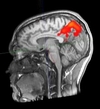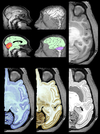
Our Research Focus
Our research technically falls under the category of “systems neuroscience”, but it is actually part of a much more general attempt to understand the most complex machine in the known universe: the brain. This is not just a figure of speech. The human brain is estimated to contain some 80 billion nerve cells, all of which are closely interconnected via some 80 trillion synapses. Thus, a single neuron is connected with an average of 1,000 other neurons and can be reached from any other neuron in the brain in a maximum of four steps. It is this enormous interconnectivity and complexity of the neural network that gives us our amazing cognitive abilities, but at the same time it poses a great challenge to scientists.
Even today there is no mathematical formula that can even come close to describing the organization of the brain. And it is highly unlikely that such formulas can be developed without many more years of multimodal experimentation (including invasive studies) and painstaking data analysis. The physicist and Nobel laureate Richard Feynman once said, “Biology students are intimidated by physics because of the very many mathematical equations found in physics books; well, this is only so because physics is simple enough to permit that kind of formalism. Biology is not.” And one of the most complicated research areas in biology is systems neuroscience.
Our work requires us to monitor both behavioral and neural activity, and it therefore involves the application of a number of both noninvasive and invasive techniques, including magnetic resonance neuroimaging, electrophysiological recordings from single and multiple neurons of the brain using microelectrodes and the electrical microstimulation of a small number of neurons using the same type of electrodes.



